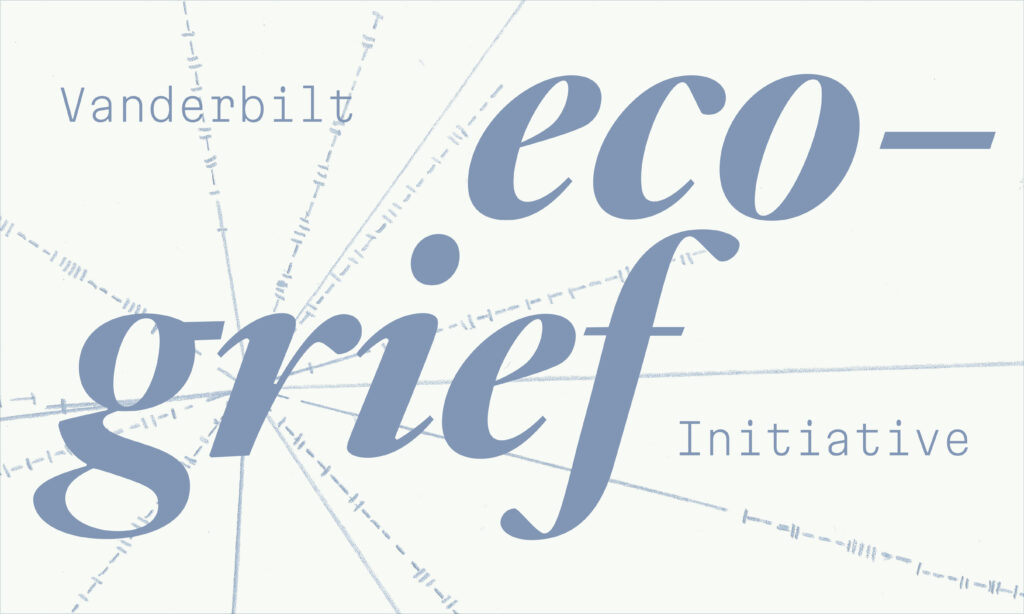The Vanderbilt Eco-Grief Initiative
Spearheaded jointly by Vanderbilt’s Curb Center for Art, Enterprise and Public Policy, the Science Communication Media Collaborative Grand Challenge Initiative, and the Vanderbilt University Theatre Department, the Vanderbilt Eco-Grief Initiative is a collaborative inquiry into the emotional landscapes of living through climate change.
Eco-grief is a term for the complex emotions—sorrow, guilt, terror, and complicity, among others—that consideration of the climate crisis and environmental degradation evoke. The Initiative, which centers artistic responses to climate change, grows out of the recognition that the feelings surrounding the evolving crisis and the difficulty of achieving consensus on how to address it are often overwhelming, making necessary conversations challenging to manage. Through theatre performances, a visual art exhibition, and guest speakers, the Eco-Grief Initiative aims to catalyze emotional reckoning as an avenue to candid dialogue, innovation, and lasting impact.
The Eco-Grief Performance Project
Four one-act plays commissioned and developed by the Initiative investigate aspects of living through climate change from distinct perspectives. Four playwrights—Gina Femia, Kristin Idaszak, Reynaldo Piniella, andJaymes Sanchez—were selected from a pool of nearly 300 applicants to write and develop plays examining eco-grief. Each playwright met with groups of Vanderbilt students to gain insight into the attitudes and emotions of the campus community toward climate change as part of the writing process. The plays will be produced at Neely Auditorium in fall 2024 using sustainable materials and methods in set and costume constructions. Student actors and production teams will be involved in the production of these pieces. See the VU Theatre website for details and performance schedule.
Weekend 1: September 26–29, 2024
- Daphne and Florence by Gena Femia explores the loss of a tree felled for a development project in the context of other losses faced by two girls as they contemplate adulthood and leaving home.
- Blue Blood Red Knot by Kristin Idaszak explores the interdependence of human and more-than-human creatures through the figure of the horseshoe crab, an ancient creature whose blood is used in pharmaceutical manufacturing to test for contamination.
Weekend 2: October 17–20, 2024
- Let Us Sit Upon The Ground by Reynaldo Piniella takes place during a student sit-in. Protestors mourn the environmental changes they have experienced and confront the inflexibility of institutional authorities in the face of the climate crisis.
- Waiting for Environman by Jaymes Sanchez considers conflicts between individuals committed to fighting climate change who disagree on effective tactics as they participate in a focus group responding to “Environman,” a proposed major motion picture studio action movie.
Extraction/Interaction
A visual art exhibition at the Curb Center highlights artists’ engagement with climate change. Extraction/Interaction will be open at the Curb Center (1801 Edgehill Avenue), Monday–Thursday, 10 am–4 pm beginning September 9th and ending December 5th.
Extraction/Interaction considers how grief can transform artistic practice into a mechanism for positive environmental impact through the work of three contemporary artists—Will Wilson, Eliza Evans, and John Sabraw. Extraction, a word that calls to mind histories of environmental degradation, displacement of Indigenous peoples, and the removal of natural resources for profit, is the conceptual thread uniting these artists’ work: Wilson’s photographs of abandoned uranium mines on Navajo lands expose and seek to remediate it; Evans’ organizing against fracking companies through mineral rights redistribution resist it; and Sabraw’s pigments made from toxins removed from polluted rivers in deindustrialized areas reappropriate it. These artistic interactions with extraction demonstrate the urgency and potential of creative inquiry into our time’s most pressing existential challenge.
Guest Speakers
The Eco-Grief Project launched in the spring of 2024 with a public lecture by Mary Annaïse Heglar, a New Orleans-based writer known for her writing in both fiction and nonfiction that dissects the climate crisis, drawing heavily on her personal experience as a Black woman with deep roots in the South. While on campus, Heglar visited classes and conducted a storytelling workshop for undergraduates that empowered them to find their voice as young people navigating climate change.
Additional guest speakers will be announced later in the fall semester.

